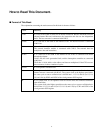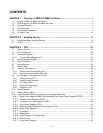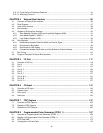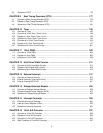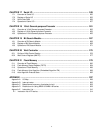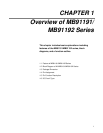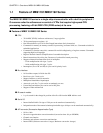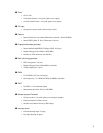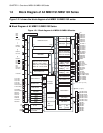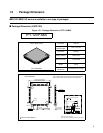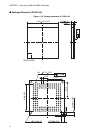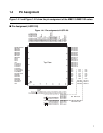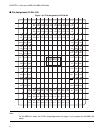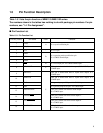
2
CHAPTER 1 Overview of MB91191/MB91192 Series
1.1 Feature of MB91191/MB91192 Series
The MB91191/MB91192 series is a single-chip microcontroller with a built-in peripheral I/
O resource suited to software servo control of VTRs that require high-speed CPU
processing, featuring a 32-bit RISC-CPU (FR20 series) at its core.
■ Feature of MB91191/MB91192 Series
●
CPU
• 32-bit RISC (FR20), load/store architecture, 5 stages pipeline
• 32-bit general-purpose register x 16
• One instruction/one cycle, 16-bit fixed length instructions (basic instruction)
• Commands for memory to memory transfer, bit processing, and barrel shift, etc.: Commands suitable for
embedded applications
• Commands for function entry/exit, command for multi loading/storing of register contents: Commands
supporting high-level languages
• Register interlock function: Simplification of assembler description
• Branch instruction with a delay slot: Decrease of overhead for branch processing
• Support at internal into/instruction level of multipliers
- 32-bit multiplication with sign: 5 cycles
- 16-bit multiplication with sign: 3 cycles
• Interruption (save of PC and PS): 6 cycles and 16 priority levels
●
Bus interface
• 16-bit address output, 8-/16-bit data I/O
• Basic bus cycle: 2 clock cycle
• Support interface to various memories
• Multiplexed data/address input/output
• Auto-wait cycle: 0 to 7 cycles can be set randomly per area.
• Unused data and address pins can be used as I/O ports.
• Support of little endian mode
●
Bit search module
• 1-cycle search for the change bit position of the first 1/0 from the MSB within a word
●
Serial I/O
• Internal buffer RAM x 3ch (up to 128 bytes can be transferred automatically)
• Independent mode of the transmission/reception buffer (up to 64 bytes can be transferred automatically)
●
A/D converter (Successive Approximation Type)
• 10-bit x 16ch
• Successive approximation conversion method (conversion time: 8.4 µs @20MHz)
• Channel scan function
• Hardware and software conversion start functions
• Internal FIFO (Software conversion: 6 stages, Hardware conversion: 6 stages)




